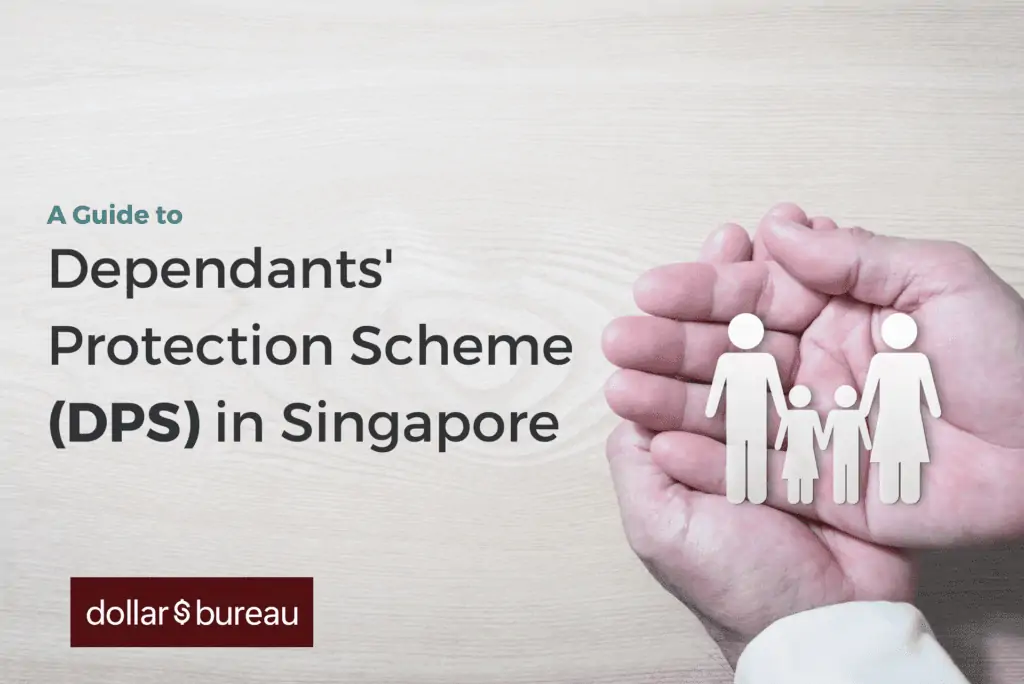The Dependants’ Protection Scheme (DPS) is probably one of the lesser-known schemes amongst Singaporeans as compared to those like MediShield Life or CPF LIFE.
And as much as you may not know about DPS, you’ll be surprised that you are in fact automatically covered when you make your first working CPF contribution!
So hooray, you’re covered. But what does that exactly mean?
Instead, the better question to ask is – what benefits does it provide me?
Stick around to find out.
What is the Dependants’ Protection Scheme (DPS)?
Provided solely by Great Eastern Life, the DPS is an optional term-life insurance scheme for all eligible CPF members from the age of 21 to 65.
It is meant to provide you and/or your families with financial protection for the first few years in the event of the insured members’ untimely death, terminal illness, or total permanent disability (TPD) – as these would likely lead to a sudden loss of household income.
As mentioned previously, you would be automatically enrolled by the CPF Board upon your first valid working CPF contribution.
However, unlike CPF LIFE or MediShield Life, DPS is not a compulsory scheme – it is optional. So, what this means is you can still have the option of opting out anytime!
You can also apply to join DPS directly if you are not automatically enrolled and if you are a Singaporean or PR.
If you’re below the age of 21, but of age 16 and above, you can also apply for DPS coverage.
Insurers offering the Dependants’ Protection Scheme
Here’s a fun fact for you: Did you know that Great Eastern Life was not the initial insurer for DPS?
Before 1 April 2021, NTUC Income provided DPS cover too!
This means that you might be covered by NTUC Income instead of Great Eastern previously. However, your policy would have been transferred to Great Eastern at the time of writing (17 August 2022).
So if you are a member who is already insured under DPS before 1 April 2021, you will be glad to know that you do not need to submit a new health declaration form for illnesses that developed on or after the commencement of what your DPS covered previously.
For most insurance policies, this is usually required when there is a change of insurer involved.
So fret not, Great Eastern Life will continue to cover any health conditions that had developed on or after your DPS commencement under NTUC Income.
Benefits of DPS
Some of the benefits that DPS has are:
- Its term-life insurance coverage of up to $70,000
- Access to special pricing offers and a range of member benefits
- Affordable premiums that can be easily paid using your CPF Ordinary Account (OA) and/or Special Account (SA)
To be entitled to these benefits, DPS requires you to declare and fully disclose all your information regarding your health in a health declaration form.
These include, but are not limited to
- All your past and current illnesses
- Any surgery/treatment medical test that you had previously undergone or will be undergoing, and
- Any physical or mental impairment
If you withhold any information, you would be at risk of affecting your future claims and it may revoke the validity of your DPS.
DPS Premium Payments and Coverage Provided
Just like any insurance plan, you are required to pay a yearly premium for DPS.
Here is what DPS will cost you based on your age group.
| Age Last Birthday | Yearly Premium | Maximum Sum Assured | Minimum Sum Assured |
| 34 and below | $18 | $70,000 | $5,000 |
| 35-39 | $30 | ||
| 40-44 | $50 | ||
| 45-49 | $93 | ||
| 50-54 | $188 | ||
| 55-59 | $298 | ||
| 60-64 | $55,000 |
As mentioned earlier, these premiums can be paid by your CPF OA and/SA.
If there are insufficient funds in your OA, the amount will only be deducted from your SA.
In the case of your CPF account having insufficient funds to pay for the maximum sum assured ($55,000 or $70,000 depending on your age), you can decide if you will either be
- Insured for a lower amount ($5,000) or,
- You can top up the difference in cash, cheque, or GIRO (General Interbank Recurring Order) within 60 days from your policy renewal date
If there is no premium paid after 60 days from the renewal date, your DPS policy will lapse.
Who can be my dependant(s)?
Now comes an important aspect, are my family members or next-of-kins the only dependants I can nominate for DPS?
The answer is no!
You can, in fact, nominate whoever you would want to receive the DPS claim benefits in the event of a death, terminal illness, or TPD claim.
Your nominees must also be of sound mind and possess the mental capacity to make decisions.
Having a sound mind means you are capable of making your own decisions, and not suffering from any permanent mental malfunctions that cause you to imagine and believe things a reasonable person would not.
If your nominees are not of sound mind, this claim will be paid to the deputy in accordance with the Order of Court or donee of a valid Lasting Power of Attorney.
A lasting power of attorney is a legal document that allows a person who is 21 years of age or older and who has the mental capacity, to voluntarily appoint one or more persons called donees to make decisions and act on his/her behalf when he/she lacks mental capacity in the future.
How do I make DPS nominations?
You must be at least 18 years old to make a nomination under DPS.
To do so, you can download the DPS nomination form available on Great Eastern’s website and mail its hardcopy to its physical office.
You will be required to have 2 physical witnesses with you who can sign the form, as well as details of your policy number (via the GE app) and nominees (Name, NRIC number, Address, Telephone Number, and Date of Birth).
Your witnesses are required to be over the age of 21, and they cannot be a nominee or the spouse of the nominee.
Similar to how you would make a CPF nomination, the percentage of benefits to your nominee(s) must be up to 2 decimal places and add up to a total of 100%. This would apply to death claims!
Here’s a hypothetical example with 5 nominees:
| Relationship | Percentage of Share (%) |
| Spouse | 40.00 |
| Father | 10.00 |
| Mother | 10.00 |
| 1st Child | 20.00 |
| 2nd Child | 20.00 |
| Total | 100.00 |
How to make a DPS claim?
Step 1: Understanding the claim criteria
The point of DPS is to provide financial protection in the event of an insured member’s untimely death, terminal illness, or TPD.
So to first ensure it will be a valid claim, you would need to know what defines terminal illness or TPD.
| Terminal Illness | Refers to an illness that a registered medical practitioner under the Medical Registration Act certifies is expected to result in death within 12 months. |
| TPD | Refers to the inability to take part in any employment permanently or the total permanent loss of physical function of any of the following:
|
Additionally, you can only make a claim if your terminal illness or TPD started on or after 1 May 2016.
You may also be asked to undergo a medical examination by an appointed Medical Practitioner.
Step 2: Understanding the claim exclusions
Exclusions are items/events that cannot be covered by DPS.
So, you cannot make a claim if any of such events occur within the first policy year:
- You committed self-inflicted injury or suicide
- You committed a criminal offence punishable by death
- Your claim arose out of your intentional criminal act
You also cannot claim any benefits if
- You suffer from serious illness, a terminal illness, or TPD before the policy commences
- You provided false or misleading statement of information
- Your claim arose from wars or any warlike operations or participation in any riot
Step 3: Fill up the necessary documents
Making a claim under DPS can fall under 2 categories: death or terminal illness/TPD, which would require different types of documents and methods of payments.
| Death Claim | Terminal Illness/TPD Claim | |
| Documents Required |
|
|
| Method of Payment | Claims will be paid to your dependant(s) according to the percentage of your nomination. If there is no nomination, the claim benefits will be distributed to the proper claimant(s) which are your family members (i.e your spouse, parent, child, or sibling) or the executor of the deceased’s estate. | Claims will be paid in one lump sum. For insured members who lack mental capacity, an Order of Court is required for payment. |
Step 4: Claim Methods
Claims can be made directly by submitting an application to Great Eastern Life.
For death claims, you can fill up this form. And for TPD claims, you can fill up this form.
Or else, a claim application will be sent to the nominees or next-of-kins (if there are no assigned nominees) upon the death of the insured member under DPS.
This is done once they are notified of the member’s death by the Immigration and Checkpoints Authority (ICA), which they would also inform Great Eastern Life.
End of DPS
DPS ends when either of these occurs:
- When you reach age 65 which is when your policy ceases,
- When a successful TPD/terminal illness claim has been made,
- Upon death,
- Upon the loss of your Singapore Citizenship or PR status,
- Non-payment of DPS premium for the minimum sum assured within the 60-day period from your policy renewal date, or
- When you opt-out of DPS.
Should I opt out of DPS?
This is a question that many are asking – should you opt out from DPS?
We think you shouldn’t opt out from DPS, but this depends on you actually.
More specifically, whether you have any life insurance protection apart from what DPS covers, and whether you can afford the premiums.
Firstly, let’s talk about coverage.
As mentioned, the DPS covers you for up to $70,000. The rule of thumb for life insurance coverage is 10 years of your annual income.
This is so that your dependants have time to financially recover.
If you do the calculations, $70,000 is sufficient coverage if you only earn $583 monthly. So unless you’re earning lesser than $583/month, it’s not enough.
Next, check whether you have any other life coverage.
This can come from your term plans, whole life plans, critical illness plans, and even your endowment and retirement plans!
If the sum of your combined death coverage is 10 years of your annual income, then you can consider opting out from DPS.
Lastly, let’s talk about affordability.
| Age Last Birthday | Yearly Premium |
| 34 and below | $18 |
| 35-39 | $30 |
| 40-44 | $50 |
| 45-49 | $93 |
| 50-54 | $188 |
| 55-59 | $298 |
| 60-64 |
As seen from the above DPS premium table, DPS is affordable starting at only $18/year.
Yes, this goes up when you reach different age groups, and you’ll lose out (a little bit) on your retirement income with the CPF LIFE, but the cost-to-benefit ratio is almost unbeatable anywhere else in the market.
That’s an extreme value you’re getting here. The DPS is definitely worth your money.
And the best part?
It can be paid using your CPF – money you can’t touch anyway.
How to opt out of DPS?
Opting out from DPS is simple. You can always call Great Eastern directly and speak to a customer service officer to opt-out.
Another alternative would be upon receiving a physical welcome letter from Great Eastern indicating your successful enrollment into DPS, it would also be accompanied by an application form that you can fill out to opt-out.
Remember that the opting-out process differs for auto-joiners and applicants for DPS.
| Auto Joiners | Applicants |
If you opt out of DPS within 2 months of the policy commencement date, a full refund will be returned to you.
If you opt out after the 2-month period, a pro-rated premium based on the remaining days of your coverage will be returned to you. | If you had applied for DPS directly and decide to terminate the policy within a 14-day period from the policy commencement date, a full refund will be returned to you.
If you terminate the policy after the 14-day period, a pro-rated premium based on the remaining days of your coverage will be returned to you. |
If you had paid for your premiums via cash, cheque, or GIRO, your premiums would be refunded by cheque.
If your premiums had been deducted from your CPF account, the premium refund will be paid back to your CPF account.
Just keep in mind that if you wish to rejoin the DPS with Great Eastern in the future, you will be required to submit a health declaration which will be subjected to health underwriting.
You would also not be entitled to the benefits provided by DPS upon opt-out.
Alternatives for the Dependants’ Protection Scheme
If you accidentally opted out, are unable to get covered by DPS, or for any reason just don’t want to have DPS coverage, there are alternatives in the market.
The main alternative to the DPS is a term life insurance plan.
They provide the same thing – low premiums for death, TI, and TPD cover. However, they tend to be more expensive relative to the DPS.
You can check out our post on the best term insurance plans in Singapore to see which is best for you.
Conclusion
Good, now you’re all up to speed on DPS.
In my opinion, DPS is a great term-life insurance plan that undoubtedly has its advantages.
There are of course many other term insurance plans in Singapore such as those offered by insurers, but DPS certainly fares well in terms of its affordability.
However, we’d still recommend getting an additional term plan to supplement your life coverage as $70,000 is not sufficient for many Singaporeans.
If you’re looking to fill the protection gap you have, we recommend you talk to a reputable financial advisor.
Know of someone who wishes to know more about DPS? Send this article their way!
Frequently Asked Questions
Till What Age Does DPS Cover Me For?
The DPS covers you until you are 65 years of age.
Is DPS Worth The Money?
Yes, DPS is worth the money as the yearly premiums you pay get you coverage that you can’t find anywhere else in the market.
What is DPS In My CPF statements?
The DPS in your CPF statements is the premiums you pay for the coverage DPS provides. Premiums are paid once yearly.
Is DPS Mandatory?
DPS is not mandatory even though you are automatically enrolled. You can choose to opt-out and opt back in anytime you wish.










